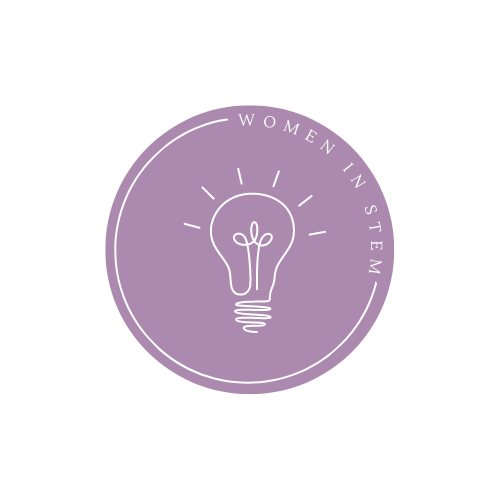WOMEN IN STEM
BLOG
07 | MARCH
NAVIGATING THE JOURNEY TO MED SCHOOL:
FACTS VS MYTHS
Hi Women in STEM! We’re all familiar with the challenges that come with studying and pursuing a career in science. The premed journey is undeniably exciting and rewarding, but let’s be real – it can also be quite intimidating.
If you’re considering attending medical school in the future, chances are you’ve been bombarded with a mix of conflicting guidance and warnings about what lies ahead for you. So, let’s begin by dispelling some of the misleading myths about getting into med school that tend to circulate…
MYTHS
MYTH #1: You need to sacrifice your personal life in order to do well.
Let’s debunk this right away – sacrificing your personal life is not a prerequisite for success in medical school! While the journey is demanding, and missing out on valuable time doing things you enjoy and time with loved ones is possible, maintaining a balance between academic commitments and your life outside of school is achievable and essential for your health and well-being.
MYTH #2: Med school is only for students with straight As.
Although it’s easier said than done, try not to worry too much about your GPA – it’s just one aspect of your application. Some good news is that a few med schools, like Western’s, focus solely on your two best years of undergrad for GPA, recognizing that academic performance can vary year to year for a variety of reasons. So, remember your chances of acceptance aren’t just determined by grades, as admissions committees also value diverse experiences and skills.
MYTH #3: All med schools are the same.
Each med school has its own unique characteristics, ranging from differences in teaching methods and program lengths to variations in missions and available opportunities. It’s important to research and identify a program that resonates with you and your goals. Not only will this ensure your compatibility with the institution, but it may also boost your likelihood of acceptance.
MYTH #4: The most difficult part of the journey is getting in.
While gaining admission to med school is a significant achievement, the journey doesn’t end there! Throughout your medical education, you’ll be continuously encouraged to grow and improve by your peers, residents, attendings, and professors. Be mindful that this pressure is an opportunity for development. Just as diamonds begin to shine after being formed under high pressure, the challenges faced in med school will shape you into a resilient and capable physician.
Now that we’ve outlined these myths, here are some facts about the journey to med school:
FACTS
FACT #1: Everyone has a unique way of studying, even for the MCAT.
Don’t feel pressure to conform to specific study methods, using specific programs like Anki, or purchasing an iPad. Although these can be useful tools for some, what matters most is finding a learning approach that suits you best.
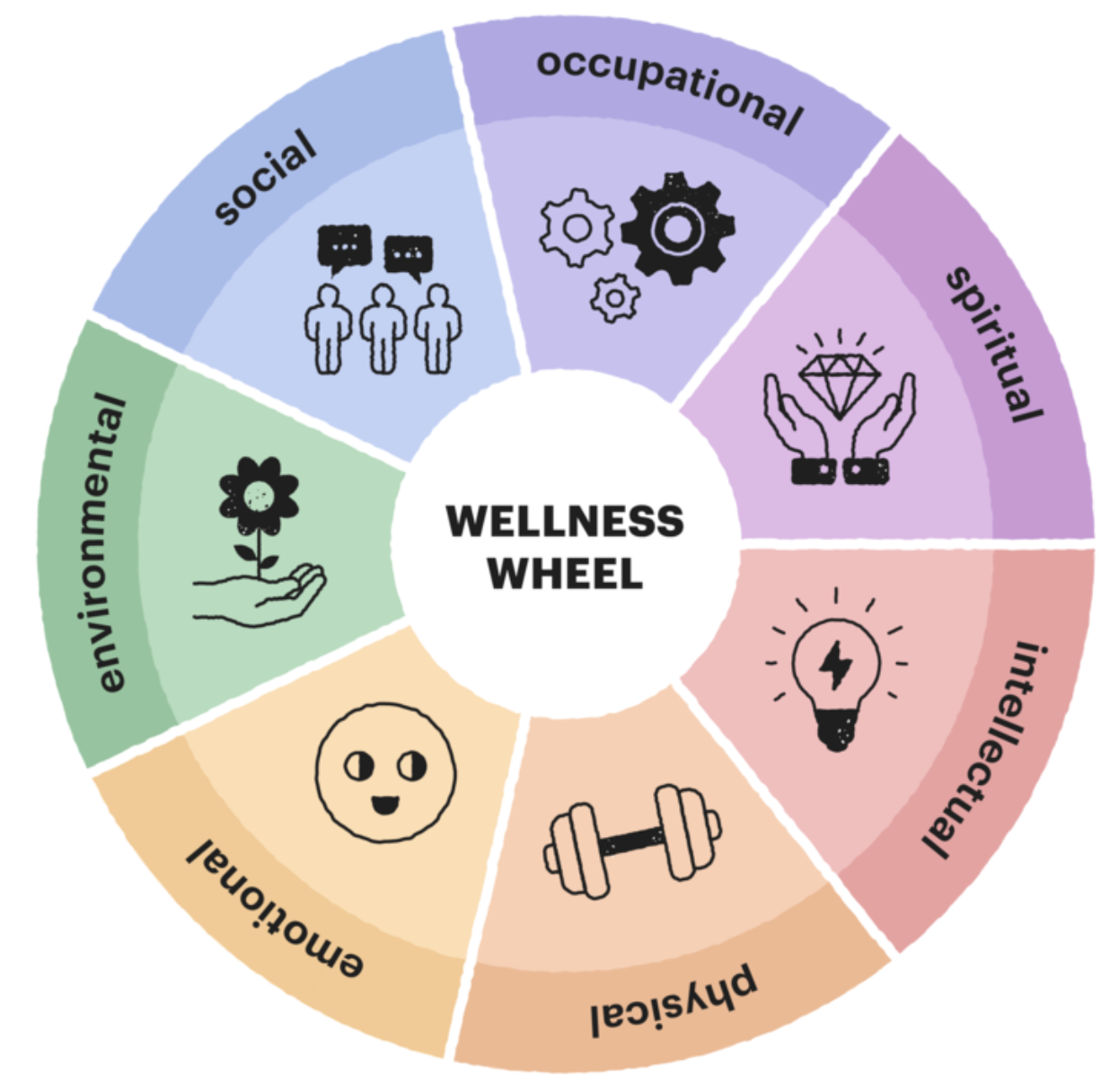
FACT #2: Clinical experience is essential.
Admissions committees highly value your dedication to the healthcare field. So, it’s important to seek opportunities to shadow various healthcare professionals and ask about potential volunteer or work positions. Also, don’t hesitate to reach out through cold emails! An opportunity may be waiting for you on the other end!!
FACT #3: You do not need to choose a specialty before getting started.
While having a preference for a particular area can be beneficial, it’s not a necessity. You’ll have ample time during your medical degree to explore and identify your special career interests.
FACT #4: It is so important to prioritize self-care.
During demanding seasons of school, it’s common that we push ourselves to the limit. This often leads us to sacrifice elements of self-care, such as sleep, socializing, and even basic necessities like proper nutrition. However, it’s crucial to remember that neglecting these areas of your life can be counterproductive. Not only is it detrimental to our physical and mental well-being, but it can also hinder our academic performance. So, to maintain cognitive function, ensure you prioritize adequate self-care, including sufficient sleep, balanced nutrition, and moving your body – all of which are things that help maintain optimal and sustainable cognitive performance.
That brings us to the end! We hope this blog helped to clarify any uncertainties you may have had and provided some reassurance through the facts. Wishing you the best of luck on your journey, you incredible Women in STEM! You’ve got this 🙂
06 | FEBRUARY
I WISH I KNEW… HOW TO BUILD
CONNECTIONS WITH PROFESSORS
Professors are kinda scary sometimes — at least they seem scary. Talking to them can initially seem like a daunting task, intimidating and filled with uncertainty. However, this couldn’t be further from the truth! Professors mainly want to help their students and are oftentimes just eager to be approached by students seeking their guidance and advice! Establishing a positive relationship with them is a pivotal step that can enhance an individual’s university experience. By taking the initiative to ask questions, communicate, and express curiosity in their courses, you can open the door to invaluable mentorship, guidance and opportunities that are enriching to your personal journey through university. But actually implementing this seems harder said than done, so here are some useful tips to help you get there!
1. Prepare in Advance
Before approaching a professor, be clear about what you want to discuss. Whether it’s a question about a specific lecture, assignment or advice on career paths, preparing and organizing your questions and thoughts in advance shows that you value their time and are serious about the conservation.
4. Be respectful and professional
Always address professors by their preferred titles and surnames unless they’ve asked you to do otherwise. Show respect for their expertise and be open to their advice and feedback. Maintaining professionalism in your interactions can go a long way in building a positive relationship.
7. Follow up
After your meeting, consider sending a thank-you email. This not only shows your appreciation for their time and advice but also reinforces your interest in the subject or guidance they’ve provided. It can be a simple note thanking them for their time and mentioning something specific you found helpful from the conversation.
2. Introduce yourself
Make it a point to introduce yourself to the professor! Go say hi and make it well-known who you are! Pro tip: if you’re still a little nervous about speaking in person, begin by sending an email and introducing yourself there!
5. Listen actively
When you’re talking with a professor, listen carefully to what they’re saying. Active listening shows that you value their input and are engaged in the conversation. It also helps you understand their perspective better, which can be crucial in academic and professional guidance.
8. Stay engaged
Don’t let your communication be a one-time event. Engage with your professors in class, participate in discussions, and show your enthusiasm for the subject. This ongoing engagement helps strengthen your relationship with them over time.
3. Attend office hours
Professors have office hours specifically to meet with students and this is an excellent opportunity for one-on-one interaction. When you visit, remind them of any previous communications, and then proceed with your questions or discussion points.
6. Seek advice/suggestions/advice
Be open to and actively seek feedback on your work or progress. This shows your commitment to improvement and learning, qualities that professors appreciate in students.
9. Be genuine
Lastly, be yourself. Professors can tell when students are genuine in their interests and communication. Authenticity fosters a more meaningful and productive relationship.
05 | JANUARY
NEW YEAR, NEW STUDY TECHNIQUES!
As students settle back into another term at Western, we know that a resolution for many of you will be to ramp up your studying game! You may find yourself in a position where you are looking for new study techniques to improve your productivity and grades while being more time-efficient and procrastinating less. But where to start? Look no further as we outline 4 great study techniques for 2024!
Brought to you by the Operations Portfolio
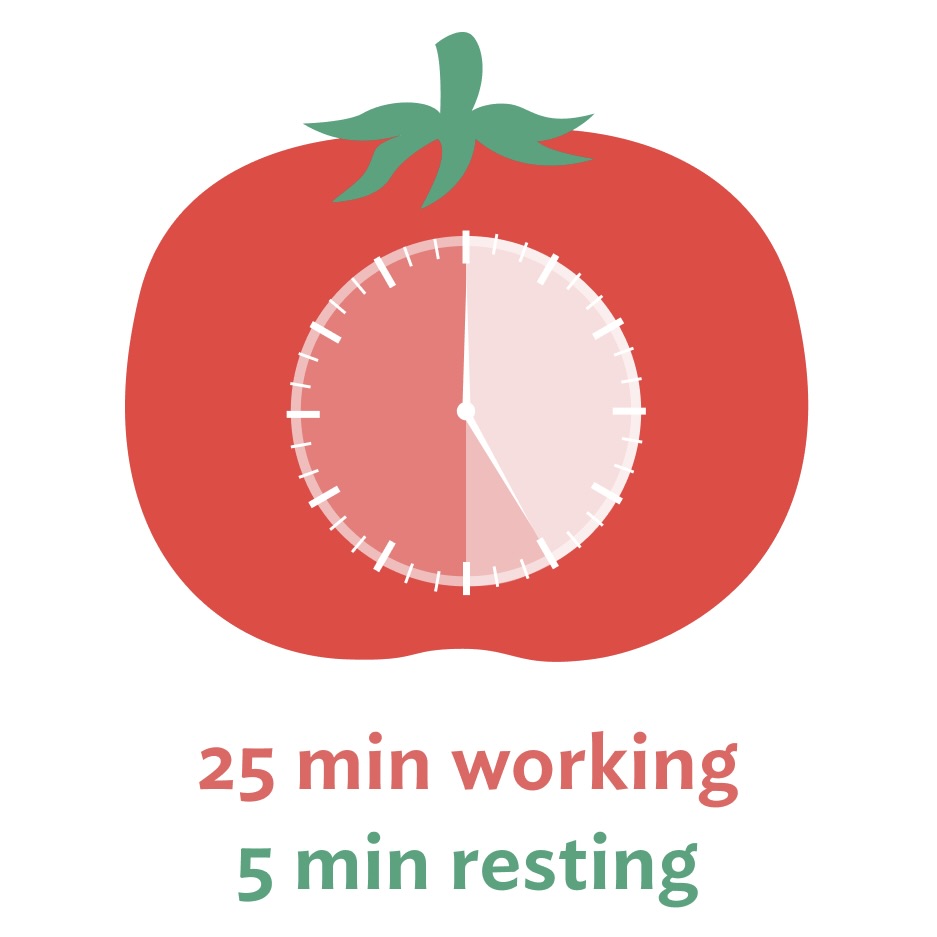
POMODORO METHOD
Named after the Italian word for “tomato,” the Pomodoro technique was developed by Francesco Cirillo in the late 1980s. It earned its catchy name in honor of the tomato-shaped timer Cirillo used to track his intervals of focused work time. Work is divided into 25-minute work periods, “pomodoros,” which are interspersed with 5-minute breaks. Four pomodoros are completed, and then there is a longer rest period. The technique has developed to the point that many people adjust the duration of the pomodoros according to their individual preferences and attention spans. One of the most popular modern takes on this method uses 50-minute intervals with 10-minute mini breaks and an extended break after four segments.
How to Implement the Pomodoro Technique:
- Choose a Task: Select a specific task to work on (i.e., readings, assignments, lectures)
- Set the Timer: Set a timer for 25 minutes (one Pomodoro).
- Work Intensely: Dedicate yourself entirely to the task at hand. Avoid checking social media, emails, or engaging in unrelated activities.
- Take a Short Break: After 25 minutes, take a short break for 5 minutes. Stretch, grab a snack, or do some quick physical activity!
- Repeat: After four Pomodoros, take a longer break of 15-30 minutes.
Tip: Use pomodoro applications that have features to prevent you from leaving the app or else the timer stops to discourage phone usage during your focused time!

EISENHOWER METHOD
This technique is used for prioritizing, delegating, and eliminating tasks and is especially useful for more difficult tasks! There are 4 main quadrants to keep in mind:
- Do: These are tasks that require your immediate attention! They typically have non-negotiable deadlines that are time-sensitive.
- Decide: Here is where long-term deliverables without any immediate deadline should be scheduled into your calendar so they are not put on the backburner.
- Delegate: This is for tasks that need to be completed eventually but are not urgent and can be assigned to someone else.
- Delete: This quadrant is for distracting tasks or tasks that do not always add value to your goal and can thus be carried out in moderation.
Remember, the best way to keep your matrix organized is by limiting it to no more than 10 tasks.
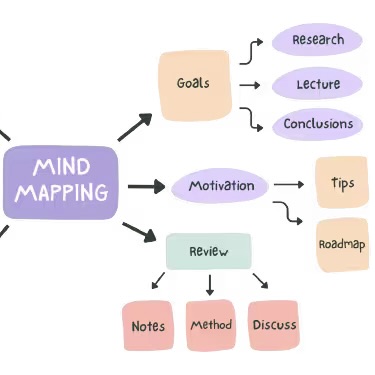
MIND MAPPING
Linked to the infamous psychologist Tony Buzan, this technique is popular for those who appreciate visuals when learning. This technique challenges the individual to summarize a large amount of material into a condensed map of related ideas. Here are the key steps to this method:
- Start with a Central Idea: On a blank page, write down the main concept, topic, or theme you would like to enhance your understanding of.
- Branch out with the Main Categories: Draw branches that extend from the main idea to represent a primary category or important thought associated with the main idea.
- Create Subcategories: Attach sub-branches representing subtopics corresponding to the relevant main category.
- Connect Ideas: Draw arrows or lines to indicate the relationships between various mind map components to connect related thoughts and simplify the comprehension process.
To make a mind map more effective and appealing, use condensed language, drawings, and colour. This organizes and emphasizes specific ideas. When condensing a large amount of material, visuals like diagrams also help in developing your understanding!
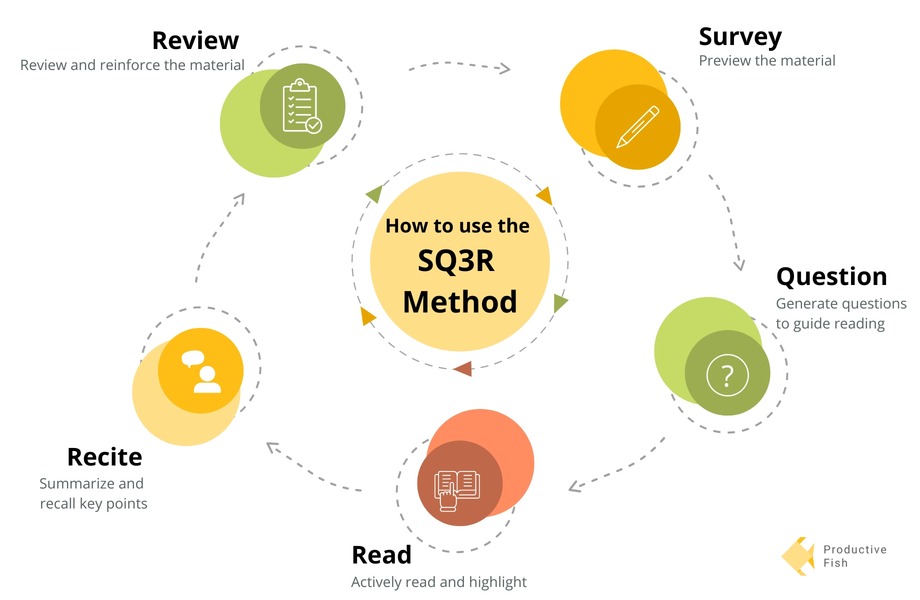
SQ3R METHOD
Developed by psychologist Francis Robinson in the 1940s, this study technique helps students identify important insights through critical thinking and better engaging with information from reading materials.
- Survey: Skim over the reading material by scanning the headings, subheadings, and other important features like exhibits or charts to give you a broad overview.
- Question: Formulate questions based on the reading material to see what you already know and what you are interested in learning or review any assigned questions.
- Read: Read carefully while paying attention to important evidence, facts, or statistics that can provide and support an answer to the questions generated in the previous step. Feel free to highlight and colour code this information as you go.
- Recite: Try and recall what you just read in a few sentences. This will make the material concise and memorable while reinforcing your own understanding.
Review: Take your insights from Step 4 and revisit the reading to seek comprehension on any unclear areas. This step does not need to be carried out immediately after Step 4! Giving yourself some time to digest the material subconsciously is also important to beating the initial learning curve.
These are just some of the great study techniques you can employ and you can even use multiple methods at once! However, do not be discouraged if some techniques do not work as every individual is different. University is all about trial and error, and part of that is being adaptable and finding what works for you. We WISh you your best semester yet!
04 | DECEMBER
STUDENT TESTED, STUDENT APPROVED:
STUDY SPOTS, PLAYLISTS AND MORE
As the year draws to a close, our Humans of WIS Blog is back for another edition. This time, we launched some polls on our Instagram to see what students think are the best study spots, study playlists, and more! As the dread of Finals approaches, we hope this blog can give you a few more insights to campus life here at Western.
Brought to you by the Operations Portfolio
Beyond the Classroom
Western has a beautiful campus, and with so many buildings to pick from, it’s no wonder the list was long whenwe asked you all what your favourite study spot on campus was! Staying true to its roots, we have all four libraries making it onto the list: Weldon Library, Taylor Library, Law Library and the Music Library. Favourite floors at Weldon include the main floor (with the super comfy sofa chairs) and the Maps & Data room. If you’re looking for some quiet, Taylor Library inside the Natural Sciences Centre is the way to go! With study silent zones, our WIS members love the quiet of Taylor’s cubicles. For some buildings closer to central campus, aka UCC, some of our WIS members recommended Thames Hall, and and Somerville House and UC Building. The Amit Chakma Engineering Building andIvey Building are also good options for studying!
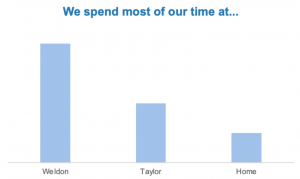
Study Grooves - A Symphony for Success
We asked what your go-to study playlist is. Here are some cool songs you can add to your playlist!
- Any Taylor Swift fans? Take a listen to the “Evermore” album for a soothing, peaceful studying vibe.
- Get in the Christmas spirit by listening to any Lofi Christmas edition music! It adds a touch of seasonal warmth, making study sessions during the holiday season a little more enjoyable.
- RnB is also great! Anything by Daniel Caesar, Frank Ocean, Sza, and Cleo Sol are amazing artists you should definitely give a listen to during this final exam season.
- White noise for the win! Serves as a subtle, non-distracting background, helping to drown out any distractions and helps with maintaining a steady focus.
Final's Frenzy: Where is Your Study Sanctuary
The most popular answers were our campus libraries, but aswe all know, libraries are crawling with students during this time of year… Our polls also showed a few study spots that we consider as hidden gems, so hear it here first!
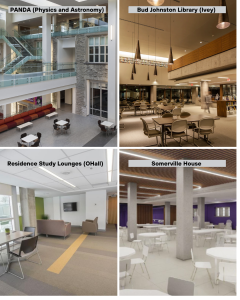
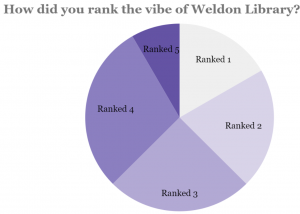
- Physics and Astronomy Building: PAB is generally quiet with little human traffic. It’s also where WIS took our executive photos, so check it out on our Instagram if you haven’t done so already 🙂 Here, you can also enjoy some natural lighting in this gem of a building!
- Ivey Building Library: Not only is this one of (if not THE) most gorgeous buildings on campus, it’s a great way to escape Main Campus! If you’re someone who enjoys studying with background noise, this is the perfect spot!
- Residence Study Lounges: If you’re living in residence, we highly recommend the numerous amenities Western Housing provides. You don’t have to book a room in advance – unlike library study rooms. With comfy couches and a great view of campus, what more could you ask for?
- Somerville: Somerville is a cozy location to study at, whether you want to study by yourself or with a group of friends. Another plus? Lucy’s, a restaurant popular with students, is also located here, so get yourself a little pick-me-up as a reward afterwards!
Drink to Think: Your Favourite Study Drinks Unveiled
Here are some of the top study beverages students drink according to our polls – take a look!
And Finally... Study Like a Pro!
Stuck in a rut? Try out these study tips we collected from students and see if they work out for you. Good luck on Finals everyone!
03 | NOVEMBER
LIFE AFTER WESTERN: POST-UNDERGRADUATE PROGRAMS
FEATURING ESTABLISHED WOMEN IN STEM
Welcome to the November edition of the WIS Blog! A common question most undergraduate students struggle with is “What can I do with my degree after Western?”. Often, it can feel like there are either no opportunities or too many potential paths to take.
This month, we will be exploring a few of the countless post-undergraduate opportunities within the STEM field. Additionally, we will be showcasing some of the accomplished women in STEM whom we encountered during our successful Toronto trip this month.
Brought to you by the Operations Portfolio.
Post-Undergraduate Career Paths
There are a variety of post-undergraduate and postgraduate opportunities to choose from! Sometimes the best place to start is first establishing your fields of interest. Here is a sprinkle of fields that may spark your interest:
Graduate School: Pursuing an advanced degree is often a part of a STEM individual’s journey in securing a post-graduate job. Pursuing a masters, post-graduate program, PHD, or a postdoctoral degree all allow you some degree of specialization in a field of your interest, as well as give you the opportunity to advance your knowledge, learn soft skills critical to conducting yourself in the professional space, and in research-based degrees, allow you to be a published name in academia, contributing to critical advancements in STEM.
Note: Tune into our November podcast, featuring the clinical research experiences of an undergraduate and PHD candidate at the Robarts lab here in London!
Academia and Teaching: If you have a passion for education and inspiring the next generation of STEM lovers, teaching or academia may be your path. This sector combines many skills such as communication, public speaking, research, and more. Simultaneously, you may choose to actively participate in groundbreaking research!
Entrepreneurship: There is always room for innovation in the STEM field. As an entrepreneur in STEM, you have the opportunity to leverage your groundbreaking ideas, paving the way to launch successful businesses that contribute to shaping the future of emerging industries to address real-world challenges.
Industry: Bridging STEM and the corporate world can open up a plethora of possibilities ranging from healthcare and technology to manufacturing. As an industry researcher, engineer, project manager, or data scientist, you could contribute to cutting-edge innovations, shaping the future of science! Many of the women in STEM we met on our Toronto trip pursued such positions and are members of multidisciplinary teams that work together on impactful projects.
Government and Public Policy: As an advocate or policy analyst, you could play a pivotal role in shaping the policies that regulate future STEM initiatives. By taking on roles in government and non-profit organizations, your impact transcends beyond laboratories and contributes to transformative changes in research regulation, novel initiatives in health, EDI, and overall sustainability.
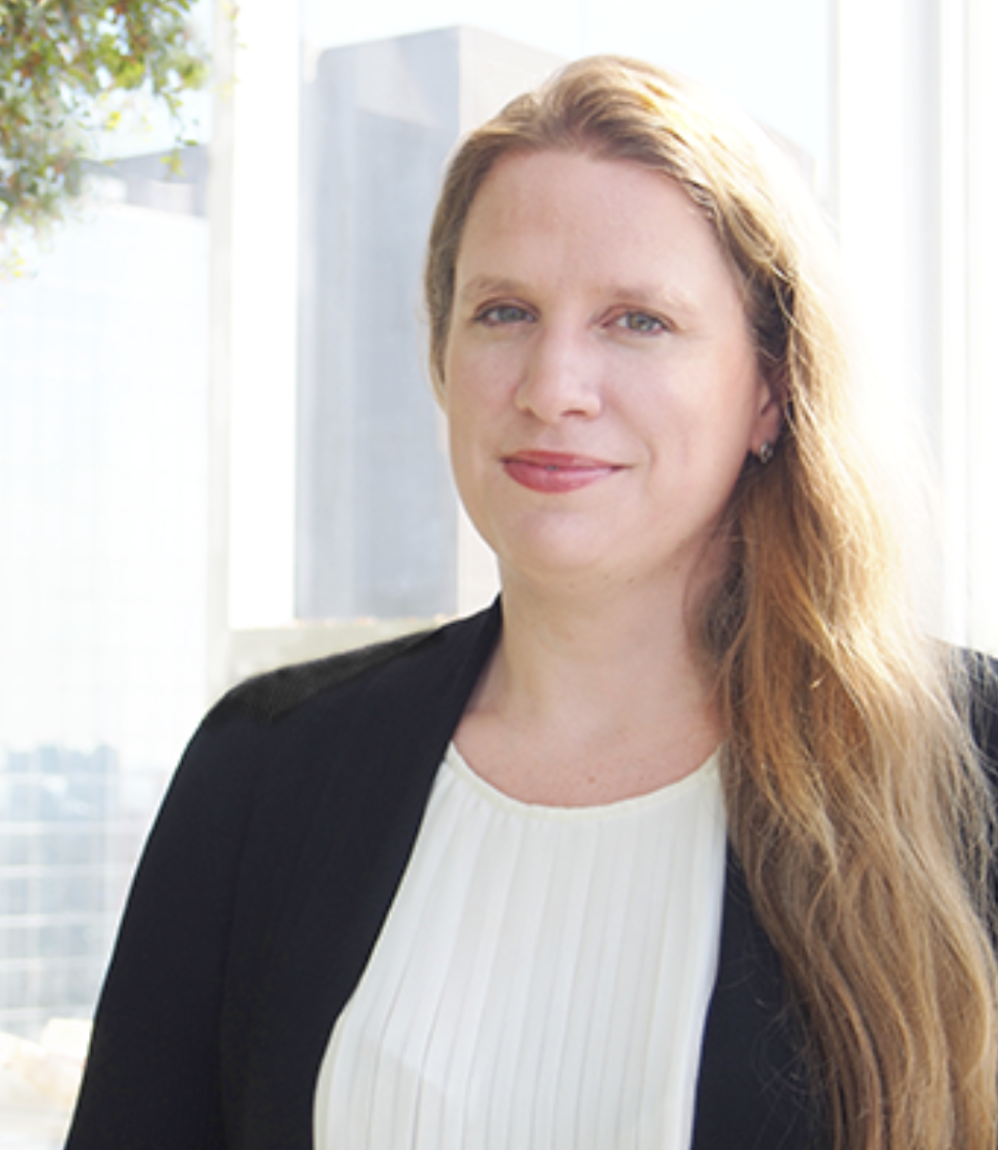
Toronto Trip Feature: Established Women in STEM
OICR (Ontario Institute for Cancer Research): OICR provides practical solutions that will enhance the quality of life for cancer patients. As a center for world-class cancer research, they collaborate to create novel approaches for early cancer detection, more efficient cancer treatment, and prevention of cancer recurrence.
Sarah Barker
Position(s) Held:
- Post-doctoral fellowships at University of Toronto in Molecular Genetics
- Research Associate with University of Toronto
- Director of Protein Production, Centre for Commercialization of Antibodies and Biologics (CCAB)
- Senior Program Manager with Diagnostic Development at Ontario Institute for Cancer Research (OICR)
Undergrad Program: BScH from Queen’s University in Biochemistry
Post-Graduate Program: Honours PhD from Johns Hopkins in Biology
Words of Wisdom: Follow what interests you, even if it is a deviation of your current path.
Stay curious. Remain open to learning new things, who knows where it will lead you. Don’t be afraid to be the only woman in a room/space, but also don’t exclude others from following you.
Ontario Genomics: Ontario Genomics leads the application of genomics-based solutions across key sectors to enable healthy people, a healthy economy, and a healthy planet. They focus on the intersection of basic science research, industry and nonprofits to enable researchers to redefine the present and future of health, agriculture, and environmental sustainability.
Luana Langois
Position(s) held: I started working at Ontario Genomics two weeks after defending my master’s thesis and have been here for a little over two years! However, during my training, I was actively involved in several initiatives. Most notably, I founded a research club that became Western iGEM, which introduced me to many amazing people, including folks in the Ontario Genomics team. This is how I got my job!
Undergrad and Graduate program: I am an Oakridge SS graduate and went to Western for both my undergraduate and master’s. In undergrad, I graduated with an Honours Specialization in Biochemistry and Genetics. In graduate school, I was in the Microbiology and Immunology department in Dr. Gregor Reid’s lab studying host-microbe interactions in salmonids (Chinook salmon and rainbow trout).
Words of WISdom: The feeling of not knowing whether my time was being well spent on the extracurriculars I chose was not foreign to me. This was especially true because I was trying to start something new. SynBio was not a thing at Western at the time and I constantly wondered if all the effort I put in would ever amount to something that would last beyond the duration of my program. What I did not realize at the time was that the key ingredient for success was always present: passion. This genuine curiosity led me to ask questions and dream up solutions to problems. Before I knew it, I had developed a wide array of soft skills (that are a valuable asset to me today) and was involved in several initiatives driven by a profound sense of purpose.

My lesson for aspiring Women in STEM is to first follow those passions and kindle the fire, instead of pursuing something that someone else might have dreamed for you that might not be the best fit for you.
Second, consider critical opinions/feedback, but do not be defined by them. I was often told that I couldn’t do something or that it would be impossible to achieve particular goals; these people now stand corrected.
Third, less is more–focus on 1-2 goals and go at it! This lesson was learned the hard way, so save yourself some cortisol and neurons and try to think long-term about the most important ECs/research that will lead you closest to your goals. Then, be uncompromising with them and go at it with all your might!
These featured women are a few of the inspiring individuals we were able to meet this year on the Toronto Trip 2023. If you were unable to come on the Toronto Trip this year, or are there are firms you are still interested in, join us on the Toronto Trip next year fo
We hope by reading this blog you have gained valuable real-life insights into the abundant career opportunities available to all of you 🙂 As you navigate the vast and exciting world of STEM, know that your potential knows no bounds. Even the most successful women in STEM altered their career path as they found their passion. Remember to cultivate meaningful connections with your fellow women in STEM, offering inspiration and support to one another. Above all, embrace challenges with confidence, celebrate even the smallest victories, and, as always, keep shining. You’ve got this 🙂
02 | OCTOBER
ADVICE COLUMN: SELF-CARE DURING MIDTERMS

Welcome back to another installment of the WIS Blog! As October draws to an end we find ourselves in the midst of exams season.
Oftentimes overlooked, taking care of both your physical and mental health is super important to ensuring you start and finish the semester strong, and for a lot of our freshman general members out there, this can seem like a really overwhelming aspect of the university experience.
The Operations Portfolio has taken the time to interview some of our lovely students to see how they’re practicing self-care! We hope that some of these tips and tricks will be helpful for you:
What are Some Ways you Cope with Stress?
Caroline (Director of Events, 1st Year Computer Science): I cope with stress by making lists, which is helpful in staying organized. Listening to music is a big help as well and the types of genres vary with how I feel from day-to-day. If I’m feeling more stressed, I listen to rock or more upbeat music to calm my mind a bit. Mental health walks are also so helpful with stress, anywhere between 15-20 minutes is great!
Maddie (Director of Community Inclusion, 3rd Year Medical Sciences): Anything to get my body moving like going to the gym and going on walks. Morning walks to campus, which are about 35 mins, give me time to create a mental space to prepare for the day while energizing me so I can clear my mind. Although studying and grinding is good, you need to take care of your mental health. Seeing or talking to a friend before bed gives me small things to look forward to everyday. I have to glamourize life and be the main character in my world in ways such as walking to a cute cafe to study or walking instead of taking the bus to see the fall leaves!
What does Self-Care Mean to You?
Vishna (Director of Finance, 1st Year Biochemistry): For me, self-care means spending time alone and taking good care of myself. To accomplish this, especially after a long day, I really enjoy prioritizing my skincare routine and watching my favourite show, while relaxing in bed. I also love taking an “everything shower” every so often!
How do you Stay Motivated during these Stressful Times? What does your Support System look like?
Caroline: Whenever I have a lot of things to do in a week, I think a “grind now, relax later” mindset really helps me stay motivated. I remind myself I only have four years to focus solely on school and I should take advantage of this opportunity. There won’t be another time where I will be able to focus on school, so keeping that in mind is a huge motivator for me. Friends and classmates all around me are huge support systems. Everyone’s also going through midterms, everyone’s also stressed, everyone’s in the same boat. It’s really reassuring because it also makes me feel less behind!
Vishna: To stay motivated during times like these, I focus on the future. For example, after my Calculus and Physics midterms this week, I focused on how Saturday night was around the corner and the relief I would feel then, knowing my midterms were completed, reminding myself that I just need to push through for a little bit and that all the hard work will pay off. My support system also includes my high school best friends. During stressful times, I’m sure to reach out to them on our group chat. They know me so well and know exactly how to comfort me. My family is another major part of my support system. Specifically, my brother also attends Western, so seeing him around reminds me of home and comforts me.
How do you Avoid Comparing Yourself to Others at University?
Caroline: I realize that everyone has their own set of strengths and weaknesses and we all started from different places. It’s really easy to start feeling like you’re behind in university but keep in mind that everyone is living their own lives and have completely different situations. I always remember that we only see a small portion of their lives and that helps me a lot.
How do you Recover from a Feelings of Failure at University?
Maddie: When I have a low moment or don’t do as well as I wanted to, I look at the situation and think…will this impact me in seven years? If not, I shouldn’t think about it for more than seven minutes. You need time to process bad grades and low moments. It is okay to cry but you need to move on. The only thing you can do now is make a game plan to set yourself up for success for the next time around. Everyone needs a pity party to get over something and that’s okay.
Best Piece of Advice for Freshmen going through Midterms!
Maddie: It is important to be kind to yourself. Treat yourself like you would treat a close friend. There are usually many expectations going into exam season but higher expectations make you more disappointed if the outcome is not what was desired. All you can do is try your best. I used to feel defined by my grades, especially after doing well in high school, before transitioning into university, where high grades are harder to achieve. Know you are not defined by a number or how well you do.
Vishna: Start studying earlier than you think you need to. Also, don’t rely on sites like Chegg for everything: try to complete all of your work on your own. This way, you won’t be cramming to understand and remember all of the material in the days leading up to your midterm. Finally, be sure to give yourself grace. Don’t beat yourself up if you do worse than you expected on a test. Remember that it’s only midterms and finals offer another opportunity to improve your mark!
01 | SEPTEMBER
A WARM WELCOME FROM WIS
“In WIS, we strive to inspire and foster growth within our community for students of all backgrounds to explore their interests in STEM and future career options.”
Welcome to a brand new year of WIS, Mustangs! On behalf of the entire executive team, we are more than excited to share the events and opportunities we have been working on for you! Whether you are stepping onto campus for the first time or are already part of the WIS network, we could not be happier to have you join the family. As a preface to the year, here is what you can expect from us!
To kickstart, our executive team structure is introducing an all-new portfolio, Academics, so this means even more opportunities to get involved with our leadership team as director applications for all portfolios will open in the next few weeks. Academics is a portfolio that will focus on executing development workshops and managing resource hubs for club members that cover anything from networking tips to coffee chats and career acceleration. Moreover, the current executive team structure also comprises our returning portfolios: Community Inclusion, Events, Finance, Marketing, and Operations!
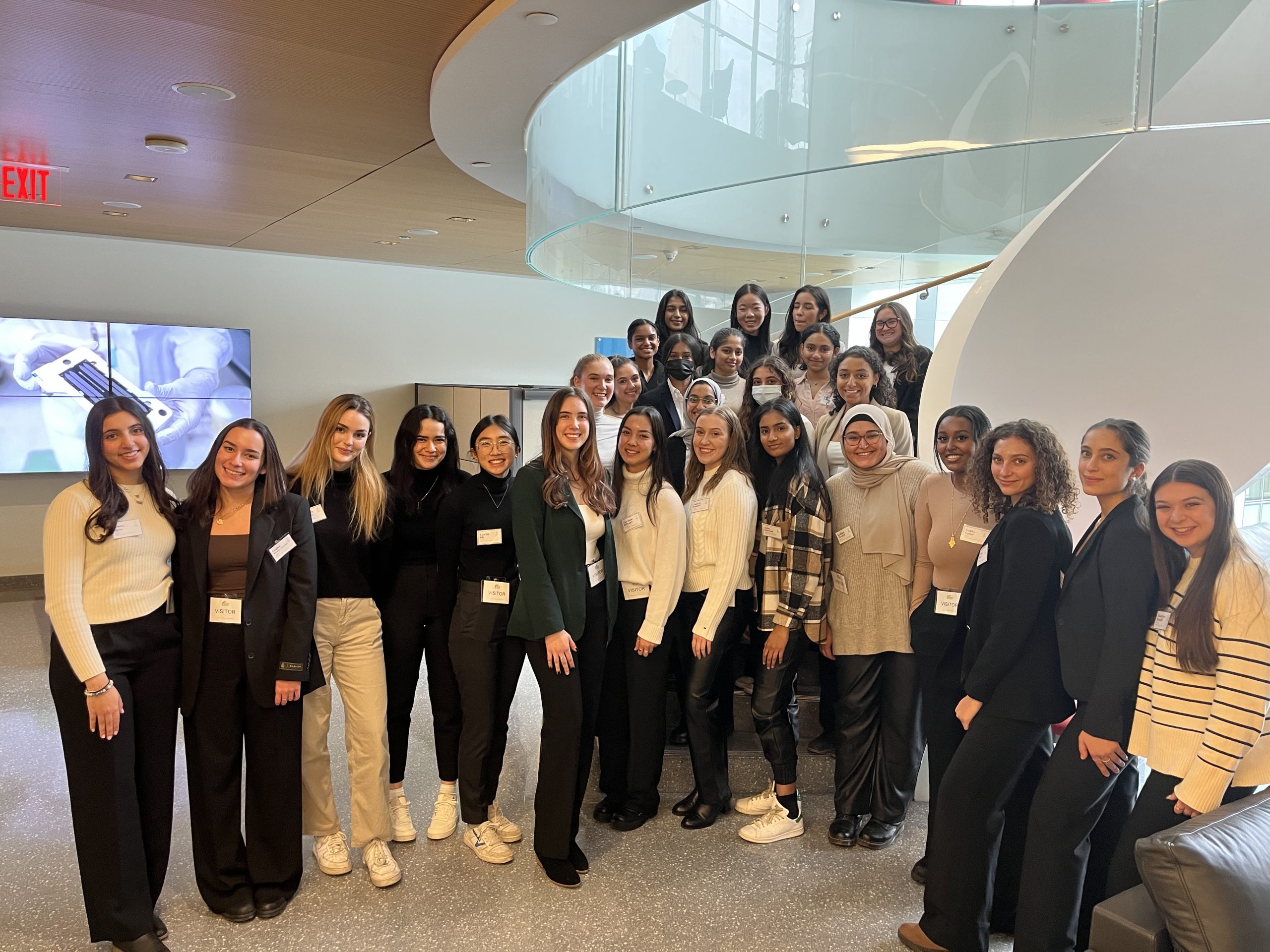
Some of our hallmark events this school year to look forward to include our infamous Toronto Trip, where we provide students the opportunity to travel to Toronto and network with the largest firms in life sciences, engineering, technology, and business. Coupled with brand new podcast episodes on student life, research opportunities, and grad school prospects featuring guest speakers across campus, WIS is also officially launching its popular Humans of WIS campaign, which features general members, as a blog this year. That’s right, we want to celebrate you! You’ll have the chance to be featured in student interviews for monthly blog articles, so this is a great way to share your experiences in volunteering, internships, research, and more.
Want to keep up with us? Bookmark this website and check in regularly for new blog articles, newsletters, and podcast episodes. In the meantime, explore our website and see what else we have to offer by clicking through each tab! We also update our general members about upcoming events and club opportunities via email. And, of course, our social media is always churning out new content, so follow us on Instagram and Facebook and check out WISPod on Spotify!
That said, WIS is ready to welcome you into our community. We have always strived to provide and promote an all-inclusive organization that offers a safe environment for people of all genders and academic backgrounds, and we can’t wait to meet you!
Looking forward to an amazing year ahead,
The Operations Portfolio
